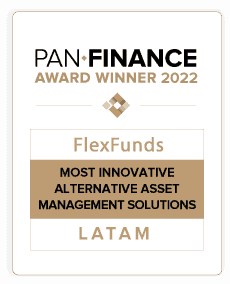- Throughout this article, you will find information about the trend in investment management through collective investment vehicles versus separately managed accounts according to the 1st Annual Report of the Asset Securitization Sector. Download it here!
- The information in the article is useful for asset managers who want to understand the trends and the direction in which the industry is evolving.
- FlexFunds enables advisors and investment professionals to securitize portfolios intelligently through cost-effective investment vehicles. Contact us!
Collective investment vehicles have experienced solid and robust growth in recent decades. As drivers of financial democratization, they have allowed millions of managers worldwide to access financial markets quickly, with high diversification and professional management.
Among the most popular instruments in collective investment are Exchange-Traded Funds (ETFs), pension funds, hedge funds, and index funds, with a popularity that has increased managed capital extraordinarily.
However, in recent times, as happened after the 2008 crisis, there is a growing interest in separately managed accounts (SMA), providing greater flexibility and transparency.
Pros and cons of both approaches: collective investment vs. separately managed accounts
Separately Managed Accounts (SMA) have gained importance in a climate of high uncertainty. Since central banks declared the new era of growth in interest rates since March 2022, a particularly turbulent cyclical shift has occurred due to external shocks such as the pandemic or the Ukraine war.
The United States and the Eurozone have experienced intense interest rate hikes in a short period. This has fueled fears of a recession that has not materialized with the expected force.
But this particularly unstable and uncertain situation, after a decade of expansive low interest rates, directly influences the investment decisions of managers. In this context, separately managed accounts come with flexibility and greater transparency.
In separate management, portfolio management is much more tailored to the client, with a more precise consideration of the tolerated risk and a higher level of transparency. The client has much more control over their portfolio, allowing the pursuit of individual goals within active management.
Collective investment vehicles, on the other hand, allow clients to access efficient and diversified portfolios easily and economically. They enable achieving a potential and investment capacity that would hardly be reached with separate accounts or individual investment.
The industry will grow towards mixed schemes
According to the 1st Annual Report of the Asset Securitization Sector and based on the survey conducted by FlexFunds among portfolio managers and investment experts, professionals are clinging to collective investment. To access this information, download the full report.
Despite the growing popularity of separately managed accounts, one in four participants thinks the industry will move towards collective investment vehicles, while the majority of experts believe the industry will grow towards mixed schemes (52.7%).
In other words, the market trend clearly points to intelligent portfolio management, taking advantage of the strengths of each of the two approaches.
Portfolio managers skillfully handle a combination of individual accounts, allowing full control over allocations to each portfolio, with collective investment, providing greater liquidity and diversification.
However, it is essential to highlight that a significant 15.4% of respondents lean more towards separately managed accounts (SMA).
Strong penetration of collective investment vehicles
Separately managed accounts provide transparency to the portfolio in an environment where investors are moving towards more conservative positions.
However, the expansion of this type of portfolio management is far from dethroning collective investment in the short term, and according to experts, it does not seem likely to do so in the future.
In the FlexFunds report, one in five respondents states that they will purely opt to offer collective investment vehicles to their clients in the future, while, on the contrary, 1.1% claim that investment managers will stop using this type of vehicle in the future.
The reality is that collective investment instruments are widespread throughout the market. Two out of three managers claim to have worked with collective investment vehicles, compared to 28.6% who have never done so.
This demonstrates the strong penetration of these mechanisms in the market, as they have evolved to adapt to competitive conditions and changing advisor needs, leveraging technological advances, and promoting accessibility to financial markets for a wide range of investors.
Advantages of the mixed model
Precisely, the trend in portfolio management is moving towards the mixed model. As revealed by the study, the majority of participants believe that investment managers will use a mixed model (69.2%) in the coming years.
Why does the mixed model prevail over a specific approach in investment management? The combination of both models allows exploiting the advantages of each, squeezing the best possibilities for the client in different circumstances.
In a changing environment, the mixed model provides a personalized and unique approach, responding to moments of uncertainty with position retreats, just as it is prepared for moments of investor euphoria.
At the same time, collective investment continues to provide significant investment opportunities, accessibility, and the best options for portfolio rebalancing in the pursuit of diversification and the highest return-risk ratio.
- Portfolio diversification: Always maintaining a well-diversified portfolio is the first commandment of a management team. The power to invest in different assets neutralizes many of the inherent market risks, such as volatility and strong fluctuations in some sectors or geographic areas. Collective investment is the most efficient opportunity to keep the portfolio diversified, grouping a wide variety of assets in a single investment.
- Accessibility: Collective investment enables access to investments in all types of financial vehicles that would not otherwise be accessible to retail investors. Leveraging collective strength is a powerful tool for the investment manager.
- Transparency: Allowing the combination of collective investment with separately managed accounts provides greater transparency for the investor, who can have more control over their portfolio. They participate in asset allocation and take on a more prominent role.
- High liquidity and varied offer: Collective investment instruments provide high liquidity, ideal for moments of uncertainty, as well as a wide range of assets.
- Flexibility: Separately managed accounts provide flexibility that collective investment vehicles cannot offer. Therefore, the mixed model allows managers to respond to market fluctuations more adapted to each individual.
For these and other reasons, experts and professionals overwhelmingly bet on a future dominated by the mixed model, in which managers will adaptively use both investment approaches to achieve their clients’ investment goals.
If you have any questions, feel free to contact one of our financial experts to make your inquiry.







